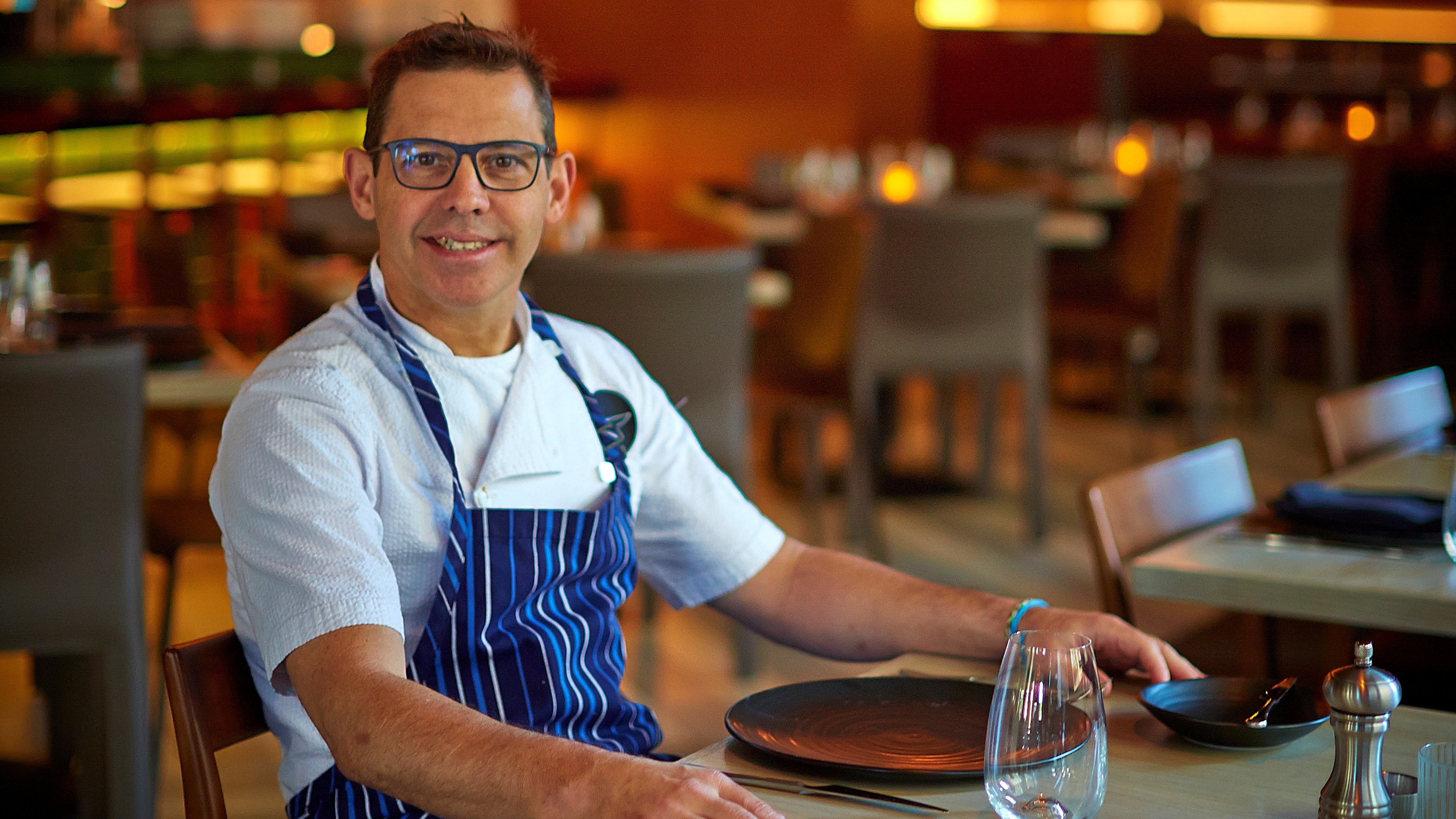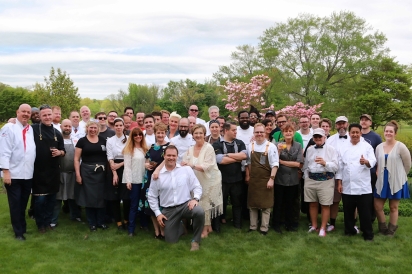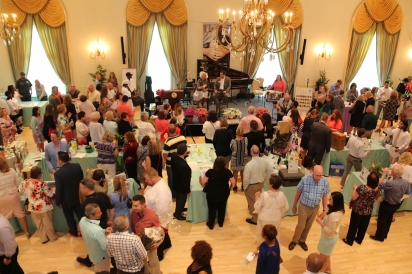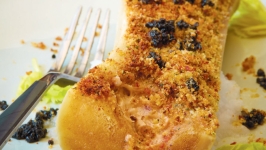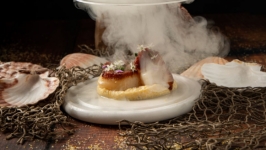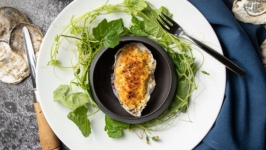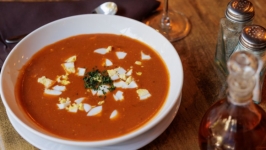An Uncommonly Common Man: The Interview with Chef John Tesar
John Tesar is a maniac. This Top Chef veteran is not a casual kitchen observer or quiet renaissance man. Tesar is outspoken, talented, energized, and just a bit left of center. The Dallas chef/owner will be in Wilmington this spring to serve as the honorary chair for the 2018 Meals on Wheels’ Celebrity Chefs’ Brunch. Talking with Tesar about his connection to the charity benefit, there is a lot more to this kitchen hooligan than the jeers that once had him tagged as the “Most Hated Chef in Dallas.”
Why Meals from the Masters?
How does Delaware hook a three-time James Beard Award semifinalist to turn up for breakfast?
JT: I love raising money for a great cause. Meals on Wheels is great. The event is about the people rather than the Food Network. They don’t show off. Some people do an event and they are socialites. Meals on Wheels really works it. And I like that it is a brunch. It is festive. This is my third year [in Delaware] and last year Anne Burrell was host, who is more infamously famous than me. I like to perform my craft and meet new people. That is what life is all about. You start to have reflections that life will give back.
Kitchen Camaraderie or Curse?
The big, bristly personalities of chefs often show up long before the chefs do. There is no shortage of swollen egos when it comes to white coats and who has the sharpest knife. Is there balance in an event like Meals from the Masters when so many chefs share the communal stage?
JT: Musicians get together to jam. Cooks rarely do. This is an opportunity to jam and have it matter. I have only met great people there, other chefs like Alex Seidel from Colorado. Good, talented people. Depending on who they are, it can change from event to event. Sometimes it is a freaking nightmare to be in a room with that many chefs. Sometimes it turns into a fashion scene and everybody shows off, they turn into a peacock.
The ego of a chef can be complicated. I prefer to be around chefs that work. It used to be a vocation, now it can be like being a rock star. Anybody that needs that much attention is suffering from insecurity. You have to be secure in who you are and what you do. Of course, the competitive drive turns things up a notch.
What’s new?
Your restaurant, Knife, is one of the shiniest stars on the Dallas restaurant view. To maintain that luster, the concept has to be kept relevant and on trend. What’s coming for the restaurant sector moving through 2018?
JT: A more relaxed atmosphere, for sure. Insert elegance and grace into that. People are really understanding food, but will always return to hamburgers, steak, pasta, and salad. Putting flowers without flavor on food just to make it look visually appealing on Instagram is ridiculous. It’s really about elevating the common man’s food. Once it became about a chandelier and a fancy plate, it got weird. Just make it taste good.
The diet of the younger generation, when they get older they have to make changes. So, plant-based proteins are big. Experimenting is big. Trying ethnic food. People are getting more and more adventurous.
Wisdom for the common man?
The restaurant business is full of novel ideas, solid classics, and a collection of colorful personalities. There are also countless ideas that launch into an abyss of failure. What inside information would help maneuver through tough times?
JT: Learn how to say no. If you are good, people need you more. As we gentrify malls, [developers] need something on the corner, on the ground floor; they need you. Landlords are terrible. If they want to charge you $60 a square-foot, say no.
If you are good at something, don’t make a bad meal. Cooking, service, and finance; everything else is a distraction. Chefs that are financially savvy last longer. The creative don’t last if they can’t handle the money side of it. Restaurants generate a lot of capital, but have a low profit margin.
Understand the geometry of money. People say, “I want to own a restaurant” and they don’t think it through, they are upside down. Know what happens as a chef?! People see only the beautiful side. And they want to get into it. It either works or it doesn’t. If it doesn’t work on paper, it doesn’t work in reality.
You can transcend. Cooks are craftsmen on the way to being artists, but you have to be a pragmatist at the same time. It doesn’t fit into most people’s wheel house. How you get portrayed is how people see you. I did Top Chef just to do it. On Season 10, I was an asshole. On Season 14, I became this very Zen guy. Everybody grows. Your track record is what will draw people to you. Make mistakes, say you are sorry, gain perspective, move on.
I found that people get famous and rich and they turn into bigger assholes. That is when you give back and do more; don’t teach people arrogance and insecurity. I have gone through this.
Why cook?
There are much easier ways than cooking to be successful. Why take on the kitchen?
JT: I’m a working-class son that makes good with things he learned from grandma. Something special, that’s good food. Education, foundation, passion: I can feel the passion of food. In France, they tell you can feel pain, as well. I just want to be myself. I don’t need a lot of attention. It is a maturation process. Chefs take their pain out in their food, comedians take their pain out in their jokes.
Where does the energy come from?
Being on television, serving guests, developing concepts: from where does the inspiration emanate?
JT: I just turned 60, grew up in the 80’s in the hardcore cooking generation. I realized that there is something to accomplish. I didn’t want to retire and fade away. Rather, I want to be able to make people share in success. I am definitely blessed. It is why I want to do work for Meals on Wheels. It makes what we do so great. It takes time. I invest my own money to do that. I take other cooks on the road to see it live, work in 3D and it gives them confidence.
Find the good people, learn and emulate them. Eric Ripert - genius! What doesn’t that guy have! He touches a piece of fish, and it turns into magic. So creative, so successful; he’s a great person. Tom Colicchio - great! Works hard, has a political point of view, does it well, does it quietly. Amazing talented chef. I look at people like that and you want to follow that career. You don’t follow the chef that says, Look at me; you emulate the good people.
It is important to mentor. We get so desperate to erase the past to create the future. Not everything is so easy.
What’s on your own menu?
Chefs eat, too. What grabs your attention?
JT: It always changes. It can range from scrambled eggs and caviar, to a really great pizza to great Japanese. Really good comfort food, simple. I like the ingredients to shine, lush textures. Like a great steak.
Is that how, arguably, the best steakhouse in Dallas was born?
JT: That’s why it was so comfortable to go into Knife. I saw a lot of bad steakhouses. I wanted affordable, honest, chef-driven. Everybody is dry aging, but not really. More established places can’t just get a new cooler [needed for the dry-aging process.] Besides, the other places are run by efficiency experts. Last thing a steakhouse needs is an efficiency expert. “CEO” equals danger. Can’t squeeze it like that.
What does it take to get better?
Meals from the Masters is a gathering of some of the best chefs in the country. What can a newer cook do to make the leap to master?
JT: Learn history and foundation. That’s what will always bring you back. You will become instinctual. Make a mistake and learn from it. Having a kitchen laboratory and a lot of money, to close for six months, isn’t realistic. You can’t experiment unless you understand the foundation. It would be difficult for some Anglo-Saxon chef to master Japanese cuisine, unless they have learned the culture. Understanding history will bring you back to quality.
I have kids that work for me who can’t make hollandaise. I want to meet their teacher. But I try to behave more these days. Mediocre cooks make you look better. Strange notion that we have to take care of the less educated rather than educating. Education will lead to a better quality of life. We have lost sight of that. It becomes a jungle out there, you have become self-educated. It is easy to get lost.
Show them that you can cook—some things are true some are not—show them who you are.
Learn more about Chef John Tesar
Learn more about The Meals on Wheels’ Celebrity Chefs’ Brunch


